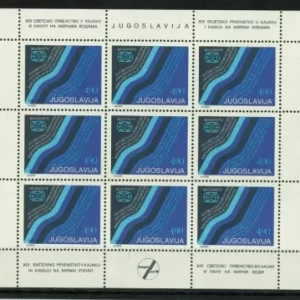Yugoslavia 1975 100th anniversary of the Bosnia-Herzegovina Uprising MNH
The Bosnia-Herzegovina Uprising of 1875, also known as the Herzegovinian Rebellion or Nevesinje Uprising, was a significant revolt against the Ottoman Empire. It was a part of the larger Eastern Crisis that eventually led to the Russo-Turkish War of 1877-1878 and the Congress of Berlin.
Background
The uprising was primarily driven by the discontent of the Christian population (primarily Orthodox Serbs) in the Ottoman-controlled provinces of Bosnia and Herzegovina. The grievances included heavy taxation, feudal oppression, and religious discrimination under the Ottoman system. By the mid-19th century, the economic situation worsened due to natural disasters and bad harvests, which increased the burden on the peasantry.
The Uprising
The revolt began in July 1875 in the Herzegovina region, specifically in the town of Nevesinje. The rebels were largely Orthodox Serb peasants, but they were soon joined by others in Bosnia. They were initially unorganized and poorly armed but gained momentum due to the support of neighboring Serbia and Montenegro, as well as from sympathizers in other Slavic regions.
The rebellion spread quickly, turning into a broader national movement against Ottoman rule. The rebels managed to achieve some military successes, capturing key towns and inflicting defeats on Ottoman forces. However, the Ottomans responded with brutal repression, committing atrocities that gained international attention.
International Involvement
The uprising attracted the attention of the European powers, particularly the Russian Empire, which saw itself as a protector of Orthodox Christians in the Balkans. The rebellion led to the involvement of the Great Powers, who pressured the Ottomans to implement reforms. However, these reforms were seen as insufficient by the rebels and their supporters.
The situation escalated, leading to the involvement of Serbia and Montenegro in the conflict and eventually contributing to the outbreak of the Russo-Turkish War in 1877. The war ended with the Treaty of San Stefano, which granted independence or autonomy to several Balkan states, including Serbia, Montenegro, and Romania.
Aftermath
The uprising and the subsequent war weakened Ottoman control in the Balkans. At the Congress of Berlin in 1878, Bosnia and Herzegovina were placed under Austro-Hungarian administration, although they formally remained part of the Ottoman Empire. This marked the beginning of Austro-Hungarian influence in the region, which would have significant implications for the future, particularly in the lead-up to World War I.
The uprising is remembered as an important event in the national histories of Bosnia and Herzegovina, Serbia, and Montenegro, symbolizing the struggle against Ottoman rule and the quest for national liberation in the Balkans.
4o










Reviews
There are no reviews yet.